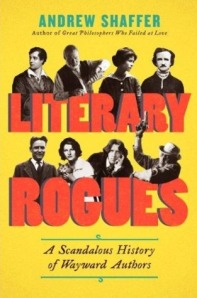Posts Tagged Andrew Shaffer
Literary Rogues: book review
Posted by Amy Steele in Books on February 24, 2013
Literary Rogues: A Scandalous History of Wayward Authors by Andrew Shaffer. Publisher: Harper Perennial (2013). Literary criticism. Paperback. 297 pages. ISBN: 978-0-06-2077288.
Ingenious concept to catalog self-destructive and raucous authors chronologically and by vice—the alcoholics, druggies, mentally ill, sexually devious or depraved. One might argue that the best authors fall into those categories. Sure. More than likely. You’ve heard the saying that one must suffer for one’s craft. You won’t read about a goodie-goodie like anti-choice, teen pregnancy advocate, Mormon and mega-selling Twilight author Stephanie Meyers in these pages. When she feels like being risqué she listens to the band Muse. Author Andrew Shaffer does mention best-selling author Nicholas Sparks [The Notebook, Dear John] who won’t write anything that will shock his Grandmother. Thus explaining the teen obsession with his novels at the box office. Doesn’t hurt if Ryan Gosling or Channing Tatum stars in it of course.
Many writers, particularly in earlier days drank and did drugs to self-medicate, to mask pain and mental illness. For instance poet Lord Byron (1788-1824) liked to shoot pistols indoors and drank wine from his ancestors’ skulls. Often in “black moods” he reportedly slept with 200 women in Venice in one year. Admirers sent him locks of hair which he kept. He impregnated a cousin. Sure this all can be romanticized but any psychiatrist would read this as a sign of bipolar or mood disorder today. Dorothy Parker (1893-1967) smoke three packs of Chesterfields a day and used tuberose– a perfume used by undertakers to mask the smell of death– to cover up her extensive drinking. She also had an affair with F. Scott Fitzgerald during the hospitalization of his wife Zelda.
Notorious alcoholic Ernest Hemingway (1899-1961) married four times and killed himself with a shotgun in 1961. The Beat Generation—Jack Kerouac, Allen Ginsberg, William S. Burroughs and Neal Cassady—incorporated drug experimentation, alternative forms of sexuality (I’m thinking mostly homosexuality), Eastern religion and a rejection of materialism into their work during the 1950s. After being hospitalized for multiple suicide attempts, Anne Sexton (1928-1974) started writing about mental illness and the pressures of maintaining a perfect middle-class household in the 1950s and 1960s. She successfully killed herself in 1974. Norman Mailer (1923-2007) founded alt-newspaper The Village Voice in 1955, married six times and had nine children. He was vehemently anti-birth control and pro-gun. Jay McInerney and Bret Easton Ellis partied it up with cocaine in the 80s. Elizabeth Wurtzel’s drug (not really) of choice that she wrote extensively about? Prozac. Literary Rogues turns out to be a fun, quick read in which you can skip around in or charge through.
FTC Disclosure: I received this book for review from the publisher.







You must be logged in to post a comment.